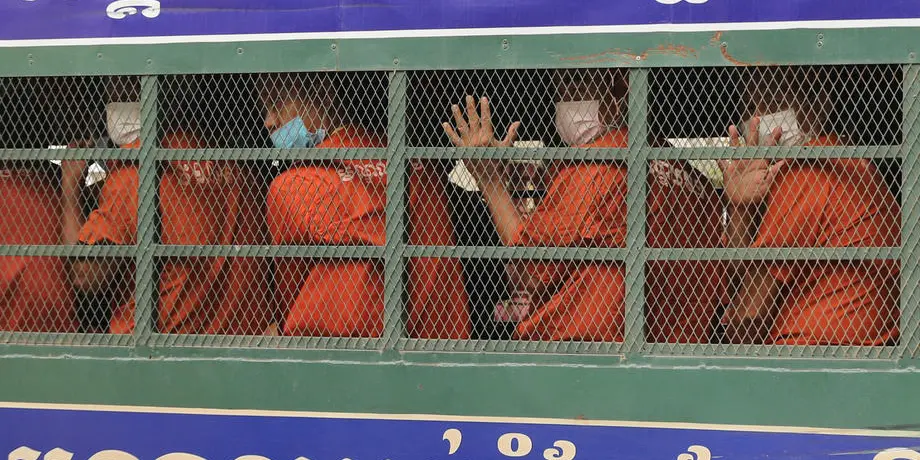
Cambodia: Drop charges against opposition members and supporters, allow those in exile to safely return, say regional MPs
January 13, 2021

JAKARTA – Regional lawmakers today urged Cambodian authorities to immediately and unconditionally drop all politically-motivated criminal charges against hundreds of members and supporters of the now-disbanded opposition Cambodia National Rescue Party (CNRP) for their alleged association with the party’s activities in 2019.
As several of those charged are currently living in exile, ASEAN Parliamentarians for Human Rights (APHR) additionally called on authorities to allow for their safe return to Cambodia.
“After years of cementing the country as a one-party state, the unprecedented number of CNRP members and activists currently on trial shows how the ruling regime in Cambodia will stop at nothing until every last voice of political dissent is wiped out. How can it be a crime for merely associating or supporting a political party? A multi-party political system is crucial in any democratic society to ensure proper oversight of the government, and Prime Minister Hun Sen’s administration is clear that they will not tolerate anything of this sort,” said Kasit Piromya, APHR board member and former Thai foreign minister.
The Phnom Penh Municipal court will tomorrow continue hearing a mass trial of at least 136 individuals – all of whom are either former MPs, leaders, members, or supporters of the CNRP – with charges including “plotting” and “incitement to commit felony” under Articles 453, 494, and 495 of the Cambodian Criminal Code for their alleged involvement in CNRP acting president Sam Rainsy’s planned return to Cambodia in November 2019.
The mass trial appears to stem from the large crackdown of political activists that took place ahead of Rainsy’s 2019 return plans. During this time, the Cambodian government took drastic measures to prevent Rainsy from returning, including the issuance of his arrest warrants in neighboring countries, deploying troops at the Cambodian-Thai border, and threatening to use armed forces to suppress the opposition. While more than 70 activists were later released, under the instructions of Hun Sen and only after Rainsy was not able to enter the country, their charges were never officially dropped.
If found guilty, the defendants face up to 12 years’ imprisonment and a fine of four million Cambodian riels (approximately $US 980).
Apart from the mass trial, former MPs, members, and senior leaders of the CNRP are also facing other separate trials related to the same purported return attempt in November 2019 with additional criminal charges such as “inciting military personnel to disobedience” and “attack”.
Of those charged, some are currently in detention and dozens more living in exile. CNRP members attempting to return again, this time to attend trial, including Vice President Mu Sochua, have reportedly had their Cambodian passports cancelled, and Cambodian authorities have said they will not issue them visas or passports.
“The fact that the authorities are not facilitating the appearance of all defendants in court only makes this case even more blatantly politically-motivated and a violation of their due process. Exiled CNRP members who have been charged must be allowed to return safely and be given the opportunity to hear and defend their case in court,” added Piromya.
These trials are only a few of other ongoing court cases against opposition leaders and human rights defenders, and come amid a relentless crackdown on civic space in Cambodia. Despite having eliminated the only viable political opposition and secured all parliamentary seats in the 2018 sham election, the ruling regime has continued to severely suppress fundamental freedoms, including the arrest, threats, and detention of human rights defenders, violent dispersing of peaceful protesters, and constriction of what little space remains of press freedom and for civil society to operate in.
“Let us not be fooled by Hun Sen and his brutal regime. It has moved beyond any pretense of democracy and we must call it out for what it is: a dictatorship. Southeast Asian governments, in particular, must be more proactive and use all leverage to pressure the Cambodian government to take meaningful steps to reverse its rights deterioration and comply with its obligations under the international human rights treaties it has ratified,” said Piromya.
Background
Following significant gains in commune-level elections by the CNRP in 2017, Cambodian authorities detained CNRP President Kem Sokha on 3 September 2017 on trumped-up charges and several CNRP members fled the country in fear of arrest. In November 2017, a Supreme Court ruling dissolved the CNRP for allegedly attempting to overthrow the government, and banned 118 of its members from politics for five years. In July 2018, Cambodia held widely discredited elections in which the CNRP was not allowed to compete. As a consequence, Hun Sen’s ruling Cambodian People’s Party (CPP) currently holds all 125 seats in Parliament.
ASEAN Parliamentarians for Human Rights (APHR) was founded in June 2013 with the objective of promoting democracy and human rights across Southeast Asia. Our founding members include many of the region's most progressive Members of Parliament (MPs), with a proven track record of human rights advocacy work.